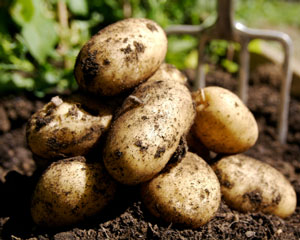
BY FIDELITY MHLANGA
Zimbabwe’s potato producers say efforts to add value to their produce are being frustrated by financial institutions’ reluctance to fund greenfield projects and they have appealed for government intervention to help them set up processing plants.
Ronald Museka, the Potato Industry of Zimbabwe chairman, said local financial institutions were only eager to fund the growing of potatoes, but farmers wanted to ramp up value addition and explore export markets.
Museka said growers viewed value addition as the next logical step in the growth of the industry and appealed to the authorities to facilitate the setting-up of new ventures.
“What we are noticing as farmers is that we are producing raw materials for industry and other sectors, but we need value addition,” he said.
“With potatoes, we want to produce frozen chips for the market.
“We want to produce fresh chips for the market or crisps straight from the farm. That is going to create a lot of employment and value for the farmer and will also create opportunities for others.”
Museka said potato farmers could only enter the export market by adding value to their produce.
- Chamisa under fire over US$120K donation
- Mavhunga puts DeMbare into Chibuku quarterfinals
- Pension funds bet on Cabora Bassa oilfields
- Councils defy govt fire tender directive
Keep Reading
He, however, bemoaned the fact that financial institutions were reluctant to give support to farmers that want to go beyond the growing of potatoes.
“The greatest challenge we are facing as farmers is that when we approach the banks for funding, they are only interested in supporting existing farming activities based on the farmer’s track record,” Museka said.
“The moment you say you want to venture into value addition through a green project, they are not interested.
“The banks are scared, they don’t want to get involved in new ventures.
“Even when you provide all the necessary paperwork, the banks are scared simply because it’s a new venture.”
Museka said the government could craft policies tailor-made for new potato processing plants to support the growth of the industry.
“Maybe someone has to come in and play that role and support the farmers, who want to go into new ventures so that the farmers are able to add value to their produce,” he added.
“There should be some funding that goes to those projects where they acquire equipment for value addition.
“That area has been neglected.
“If government or alternative funders don’t come in, the industry won’t grow.”
According to Museka, production of potatoes peaked in 2018 after farmers harvested 450 000 tonnes of the crop from 18000 hectares of land, the highest in 20 years.
“That quantity was absorbed locally, so we want to believe the market is big,” he said.
“As the product becomes more available, people continuously increase their consumption.
Zimbabwe exports an insignificant amount of potatoes as neighbouring countries South Africa, Namibia, Botswana, Zambia and Mozambique restrict imports of the crop.
“Exporting potatoes is very difficult. “So the answer is to process them to products such as crisps,” Museka said.
“The moment the product is value added, the restrictions become less.”
He said potatoes for domestic consumption were a different variety from those ideal for industrial processing.
Unlike other crops, which are seasonal, potatoes can be grown throughout the year via irrigation and have a three-month maturity cycle.
According to Potatopro.com citing data sourced from the Food and Agriculture Organisation, potato output in Zimbabwe was 66 359 tonnes in 2017, 64 127 tonnes in 2016, 61 908 tonnes in 2015 and 57 798 in 2014.
Major potato processors in Zimbabwe are Cairns and Hanawa.











